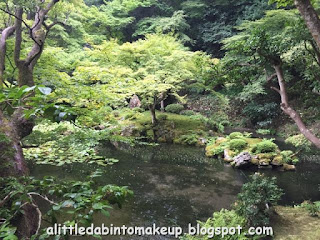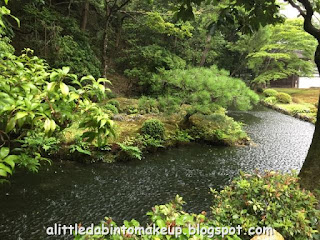After Kiyomizu-dera, hubby and I headed over to Nanzen-ji with our friends C. and A. Again they didn't quite fit this gigantic temple complex into their schedule during the week before we all met up, so we went together instead. The current temple dated to 1597 but the original temple was founded in 1291 and burned down a few times since in 1393, 1447, and 1467.
Hubby and I were here last in August of 2005, yes, 11+ years ago (boy do I feel old...). At the time, we took a different route and ended up at the aqueduct below then worked our way backwards. This time around we took the "proper" route and went through the main entrance first to see the Sanmon (三門). The sky looked all gray and gloomy at the time because it was about to rain.
Apparently, this is the second Sanmon built in 1628. The original was built in the 13th century but was destroyed by the imperial government in 1369. No idea why. They actually allowed visitors go up to the second floor surrounding balcony for a small fee, so we all went up for a peek. Too bad the second floor interior wasn't open to the public, as it contained paintings, etc.
I pretty much did a full round for photos of the surrounding sub-temples and buildings from the Sanmon's second floor.
I think this is Tenju-an (天授庵), a sub-temple of the Nanzen-ji with a gorgeous garden we did visit. I'll post these photos in a separate post.

Looking back at the main entrance gate and the nearby buildings.
We're looking at the Hatto (法堂, Dharma hall) here.
No idea what these buildings are.
Moving on to see the Hatto.

One of the many side streets.
The Japanese for "aqueduct" is "suido-kyo" or "suido-bashi" (水道橋), but this one is called "sosui" (疏水, canal), or more specifically, Biwako-sosui (琵琶湖疏水, Lake Biwa Canal). It carries water from Lake Biwa to the city of Kyoto, passing through the Nanzen-ji complex. The first time hubby and I saw this, we were quite puzzled as to why there's a Roman aqueduct running through an old Japanese Buddhist temple. This canal was completed in 1890, and beyond it is Nanzen-in (南禅院) with yet another gorgeous garden below.
Nanzen-in is what's left of Emperor Kameyama's residence when he took up monk-hood with Zen Buddhism here at Nanzen-ji. Despite the wide opened sliding screen doors, the interior of the temple wasn't open to the public. It was look-only.

But we really came for the garden anyway, and here it finally rained, forcing us to stay for a while. Watching the rain here was really magical. Look just how green and lush everything was!
Following this path here, visitors can actually take a walk around the garden, going behind some trees and come out at the low bridge above.
Just as I came out onto the low bridge, it started raining. Then it started raining really hard. And then it started pouring. Along with several other visitors, we sat there on the edge of the temple and waited out the rain.
Next up, Tenju-an and its beautiful garden.




























































2 comments:
Do you happen to have a "must do, must eat, must buy" sort of list on the blog in regards to Tokyo? I'm vacationing in a month and would appreciate any recommendations
Hi L,
There isn't a "must do, must eat, must buy" list on the blog, because I think it's entirely subjective and the things to do, eat, and buy really depends on personal taste.
So if you're curious with anything specific I posted about on the blog, please feel free to ask questions and I'll be more than happy to elaborate.
Enjoy your vacation in Tokyo. So envious!
Cheers,
D.
Post a Comment